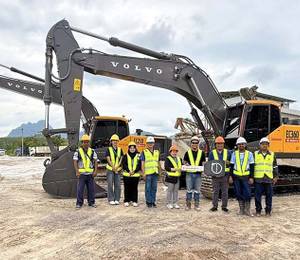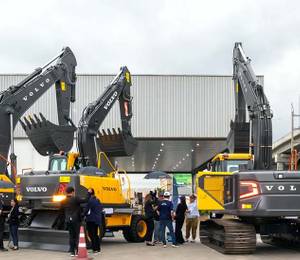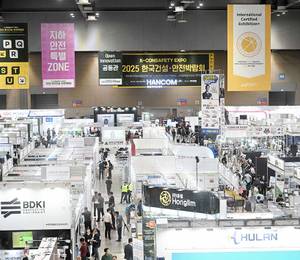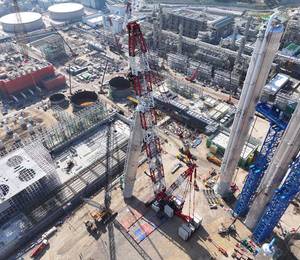InEight, a global leader in construction project management software, has launched its second annual Global Capital Projects Outlook. This report draws insights from research conducted with 300 of the world’s largest capital project owners and contractor construction professionals across the Americas, Europe and Asia Pacific.
The research reveals that 96% of respondents are either very or fairly optimistic about their organisation’s growth prospects for the next year, up from 92% in 2021. Digital technologies (57%) and data collection, analytics and insights (53%) offer top opportunities for growth, however almost all (93%) respondents said that their experience of change management left room for improvement, signalling a need for a more sophisticated, human-centric approach to technology implementation.
Of particular concern, respondents identified uneven or sporadic implementation (58%), process and data integration issues (54%), poor communication (51%) and technical and system limitations (51%) as the top frustrations caused by technology implementation.
Similar trends were also identified when asked about barriers to greater technology investment, with respondents identifying the challenge of integrating with existing systems, and a lack of technically skilled talent to smooth the process, as key issues.
“Everyone we speak to is talking about growth opportunities for both owners and contractors. The optimism, resilience and confidence of the industry is almost tangible it’s so strong,” explained Jake Macholtz, CEO of InEight.
“This is especially encouraging given the economic backdrop organisations are operating within and the implementation challenges associated with digital transformation. It seems to be that the prospect of leveraging digital technologies to build a better world is keeping spirits high.”
Human-centric transformation
The Outlook found that respondents see digital technology as broadly helpful in their day-to-day roles. Of most benefit: gaining detailed and holistic information on projects and events (51%), prioritising tasks/managing project workflow (50%) and giving reassurance that environment, health & safety (EHS) policies are being followed (54%).
However, highlighting the need for a human-centric approach, 94% of respondents said they have specific concerns about the future of digital transformation. Reduced in-person communication (45%), professional experience and human intuition being replaced by technology (43%), damage to work-life balance (41%) or the replacement of jobs by automation (39%) were all front of mind for respondents.
When asked what benefits they hoped digital transformation could deliver in future, respondents said more automation (49%), more control (48%), greater strategic insights (47%) and better communication (49%).
“Respondents are clear on the benefits of digital technologies and eager to realise this new vision of the future, but right now the industry is falling short when it comes to managing organisational change, making digital transformation unnecessarily arduous,” said Mr Macholtz.
A tenuous operating environment
Against a backdrop of supply chain shortages, inflationary pressure, energy challenges and war in Ukraine, capital project owners and contractors are unshakably positive about the direction of the industry. Notably, respondents reported a significant increase in construction and capital projects spending (up from 68% last year to 76% in 2022) while resilience also remains high, with 91% of respondents considering their organisation to be very or fairly resilient.
However, in a departure from last year’s Outlook, the completion of projects on time and on budget has fallen dramatically. On schedule completion, as reported by contractors, has fallen 16% year-on-year from 51% to 35%, while completion on or under approved budget has also fallen from 51% to 38%. Owners are yet to see quite the same impact, reporting 43% of projects completed on time, and 45% on budget.
Underlining the tenuous global operating environment, respondents highlighted unmanaged or unexpected risk as the most influential factor on whether a project will be completed on time and to budget.
The Global Capital Projects Outlook report from InEight is based on a survey of 300 large enterprise capital project and construction professionals, conducted in March 2022, via an online survey. It included 26 questions designed to gauge general confidence and optimism levels across the industry, and assess track record, plans and attitudes towards digital transformation.
Of the 300 respondents, with 100 participants drawn from each of the company’s focus regions of the Americas, Europe and Asia Pacific, giving each equal weighting in the report. Globally, 67% of respondents are project owners, and 33% are contractors.
All respondents work in construction, however in order to get a true reading of the global construction sector worldwide, InEight incorporated those working in construction roles within broader industries, including: manufacturing; mining; IT/computer services; construction; oil, gas and utilities; central government or non-departmental public body (NDPB); transport; health services; telecommunications; local government; chemicals and pharmaceuticals; and healthcare products and technologies.
The survey has been designed and conducted in conjunction with a specialised global enterprise technology market research partner, with results then analysed and submitted to InEight experts for commentary based on their experiences and vantage points in the industry.
“Where possible, results have been compared to our previous survey in 2021,” said InEight. “However, this is not possible in all cases due to new questions and wording alterations in this year’s edition.”












